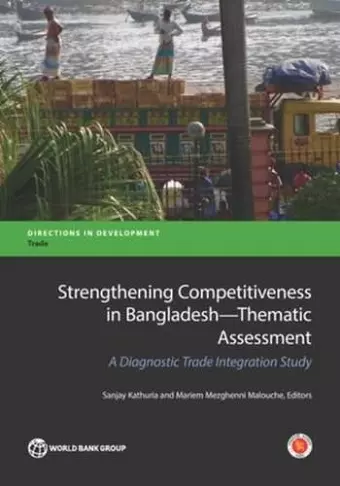Strengthening competitiveness in Bangladesh
thematic assessment, a diagnostic trade integration study
World Bank author Sanjay Kathuria editor
Format:Paperback
Publisher:World Bank Publications
Published:23rd Jul '16
Currently unavailable, and unfortunately no date known when it will be back

This book outlines a strategic framework for Bangladesh's export growth, emphasizing market expansion, product diversification, and welfare improvements. Strengthening Competitiveness in Bangladesh is essential for understanding these dynamics.
In Strengthening Competitiveness in Bangladesh, the authors present a comprehensive four-pillar strategy aimed at sustaining and accelerating export growth in the country. The strategy focuses on breaking into new markets and products, enhancing worker and consumer welfare, and fostering a supportive environment. This volume is part of a three-volume series that explores Bangladesh's trade prospects, highlighting the nation's ambition to build upon its significant growth and poverty reduction achievements. As Bangladesh aspires to become a middle-income country by 2021, it faces the challenge of providing employment for over 2 million new entrants to the labor force each year over the next decade.
The book emphasizes the need for Bangladesh to leverage its labor endowment more effectively to drive growth and absorb incoming labor. The Diagnostic Trade Integration Study outlines actionable steps under each of the four pillars. For example, breaking into new markets involves improving trade logistics and exploiting regional trading opportunities, particularly in East and South Asia. Additionally, the authors advocate for breaking into new products through rational trade policies, attracting foreign investment, and promoting services trade.
Furthermore, Strengthening Competitiveness in Bangladesh discusses the importance of improving worker and consumer welfare by enhancing skills, implementing labor safety guidelines, and creating effective safety nets. Finally, it underscores the necessity of building a supportive environment through sound macroeconomic policies and strengthening institutional capacities for strategic policymaking, which collectively aim to enhance international competitiveness and guide the government's reform efforts.
ISBN: 9781464808982
Dimensions: unknown
Weight: unknown
298 pages